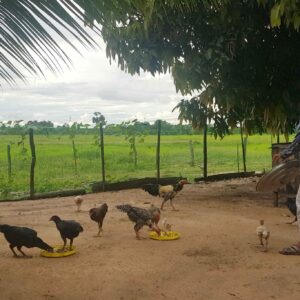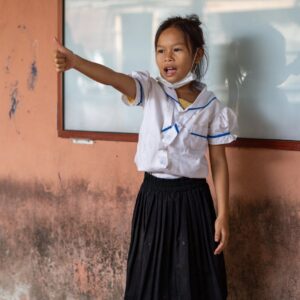As we celebrated World Children’s Day earlier this month on 20 November 2021, we would also like to applaud the commitment and perseverance of those who play an important role in ensuring children’s rights. In developing countries like Cambodia, teachers in remote communities double down on their effort to ensure their young students’ access to education, and a smooth transition of returning to schools.
It was one scorching hot morning in Kandal province, less than a week since primary schools in Cambodia re-open after eight-month closures brought by the pandemic. Preschool students, aged between 3 and 6, fully-dressed in their uniform and lined up in front of their classrooms, attentively listened to their teacher’s instructions. Soon after, they departed from their pre-school and headed toward their future school for the following academic year.
It was all a part of a Pre-school Exchange Visit organised by Aide et Action Cambodia. Visits like these are aimed to have graduating preschool students and their parents take a tour at their new school, which helps introduce young students to their first year in primary school, and prepares them for their adjustment to the new academic environment.
“It helps the students to learn about their future classroom and future teacher,” said Thin Yem, 47, one of the homeroom teachers at the pre-school.
“Parents also get to know the classroom and teacher their children are going to next year, so they can prepare for their children for their next academic year,” she added.

Having finished only grade 7 herself due to economic reasons, Yem has always been very passionate about teaching. She worked as a primary-level tutor until she landed a job as a teacher at iLead Community Pre-school Phum Kor in Kandal Province.
“I realized that I really love children. I want them to be educated and go on a good path, not wasting away their future,” she said.
Importance of Early Childhood Education
Even prior to the coronavirus pandemic, Cambodia was already behind its mission in meeting the target United Nations Sustainable Development Goal (SDG) 4 on quality education. Early childhood learning is often overlooked in Cambodia, and the access remains limited in remote and isolated areas where the majority of families of marginalised children are located. According to UNICEF, only 43 percent of Cambodian children aged 3 to 5 were enrolled in early childhood education for the academic year 2017-2018. As early childhood education is an important stage of brain development for learning enhancement, this practice often results in many students falling behind. Around 27% of students in grade 3 were not able to write a single word during a dictation test and 90% of students at the age of 15 did not reach the baseline level in reading, mathematics, and sciences.
Here at Aide Et Action, we are committed to designing and implementing projects to ensure access to quality early childhood care and education (ECCE) through enhanced teaching and quality of learning, local ownership, and responsive parenting.
Early Childhood Educators Doubling Down on Effort to Protect Children’s Access to Quality Education
When the global pandemic closed all schools in Cambodia, affecting more than 3 million children, teachers needed to transform their teaching almost instantly. For most early childhood educators, it means doubling or tripling down on efforts to ensure that their young students are learning and can smoothly return to school.
With no prior experience of online teaching, Thin Yem crammed incorporating technology to her teaching via mobile phone. However, she quickly figured out that was not doing enough for her students.
“When I was using Zoom to teach, there were very few students that could join. Hence, I decided to print out the textbooks and deliver them to their house.”
She further explained that her students’ family financial situations and lack of access to smart devices often excludes them from online schooling.
“At first, I sent them [parents] lessons via Facebook Messenger. However, some of them got back to me that they have no money to print the lessons out. I talked to the school and we decided to print handouts/books for each student. Then, I distributed the handouts at their house,” she explained.
Being a teacher during the pandemic goes beyond the teaching. In addition to online teaching and distributing learning materials, Thin Yem needs to maintain tight-knit communication with the parents to follow up on the children’s learning progress, inform them of any news, and immediately inquire about any case of suspicious absence.
“I maintain close contact with the parents throughout the school closure period. I did not allow them to be out of touch for long. I followed up instantly if they have not been in touch for a week or longer,” Yem said.
This concern is also shared by her fellow teachers at the pre-school. Frequent communication is required to ensure that the students are learning and that they can come back to class once school re-opens.
“Even when the school closes, children will still keep growing. I often advise their parents and their families to help teach them in whichever way they can. If not, the kids will outgrow their grades and might become too self-conscious to come back to school,” said Boran Samphors, another homeroom teacher at the pre-school.

Samphors further explained, “I did lose contact with a few students and their parents. Most of the cases were that they have moved away. Once I lost contact with any of the parents, I followed up almost immediately to find out what happened.”
Now that schools are reopening again, their efforts have paid off when most of their students have returned to school.
Yem, Samphors, and fellow teachers from preschool are both excited and worried about the future.
“I am very happy. Students now get a chance to learn [in the classroom] once again. Not everyone got the chance to learn via zoom/online during school closures,” Yem said.
“I can only hope that my students will study harder,” she added.





